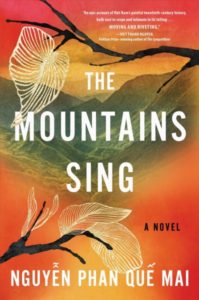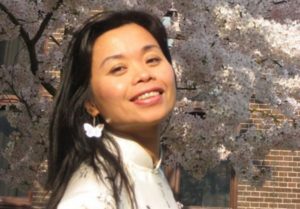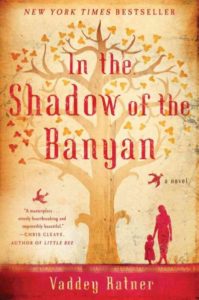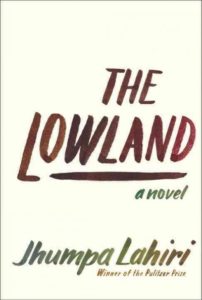September Online Book Club: The Mountains Sing
Online Book Club: What is it?
Love the idea of a book club, but you don’t have time to attend meetings? No problem!
We won’t have meetings, but anyone who reads or listens to that month’s title, either with physical copies or digital copies, can participate in our online discussion boards on Facebook and our blog posts.
If you’re busy, but love to read, this could be the perfect Book Club for you! Join us and keep the conversation going!
The September Online Book Club title is The Mountains Sing by Nguyen Phan Que Mai.
About The Mountains Sing
From the publisher….
With the epic sweep of Min Jin Lee’s Pachinko or Yaa Gyasi’s Homegoing and the lyrical beauty of Vaddey Ratner’s In the Shadow of the Banyan, The Mountains Sing tells an enveloping, multigenerational tale of the Trần family, set against the backdrop of the Việt Nam War. Trần Diệu Lan, who was born in 1920, was forced to flee her family farm with her six children during the Land Reform as the Communist government rose in the North. Years later in Hà Nội, her young granddaughter, Hương, comes of age as her parents and uncles head off down the Hồ Chí Minh Trail to fight in a conflict that tore not just her beloved country, but her family apart.
Vivid, gripping, and steeped in the language and traditions of Việt Nam, The Mountains Sing brings to life the human costs of this conflict from the point of view of the Vietnamese people themselves, while showing us the true power of kindness and hope.
The Mountains Sing is celebrated Vietnamese poet Nguyễn Phan Quế Mai’s first novel in English.
About Nguyễn Phan Quế Mai
From the author’s website….
Born in a small village in the North of Việt Nam in 1973, Quế Mai migrated with her family to the Mekong Delta, South of Việt Nam when she was six years old. Quế Mai currently lives in Jakarta, Indonesia with her husband and two children. She has been running weekly creative writing workshops for Afghan refugees at the Roshan Learning Center. She is actively involved in sustainable development work in Việt Nam and has been acknowledged with the Hanoi International Women’s Club Female Vision Award and the Australian Alumni Award for Sustainable Social Development.
Quế Mai’s latest work, THE MOUNTAINS SING, is her first novel and also the first book she has written in English. She only had the chance to learn English from the 8th grade and with THE MOUNTAINS SING, Quế Mai has become the first Vietnamese citizen whose novel in English is published to international acclaim.
Readalikes for Invisible Women
If you leave me by Crystal Hana Kim
In the shadow of the banyan by Vaddey Ratner
The lowland by Jhumpa Lahiri
Discussion questions for The Mountains Sing
1. There are many major historical events featured in the novel. How much did you know about these events before you read The Mountains Sing? Did the story show you a new side to any events you were already familiar with?
2. Many of the characters in The Mountains Sing experience terrible things, and some of them must make difficult choices. Each of them handles their experiences differently. Te Son ca helps Huong on her journey. What other objects, memories, people, or conversations help each character to endure and recover?
3. War stories are often told from a male perspective. In The Mountains Sing, Huong and Grandma Dieu Lan take turns narrating their stories. How might the novel differ if it had male narrators? Why do you think the author chose to have women and girls tell the story instead?
4. Which character did you feel the most sympathetic toward? Te least? Is that different from which character you like the most and least, and if so, why?
5. In addition to descriptions of war and pain, The Mountains Sing features many descriptions of gorgeous landscapes, interesting city sights, and delicious foods. Were there any locations that you would like to visit or have visited? Any foods you would like to try or have tried?
6. According to Huong, proverbs are the essence of Vietnamese wisdom, passed orally from one generation to the next, even before the written Vietnamese language existed. Two examples are Trongcai rui co cai may (Good luck hides inside bad luck) and Ac gia ac bao (Cruelty dispensed, cruelty returned). Do these proverbs ring true for you? Were there other proverbs that resonated with you as particularly true or meaningful?
7. In The Mountains Sing, Vietnamese names and words appear with their full diacritical marks. For Vietnamese speakers, these marks are necessary to interpret meaning: for example, the words ma, mả, má, mà, mạ, and mã all have separate meanings (ghost, grave, mother, but, young rice plant, and horse, respectively). Nonetheless, it is unusual for an American novel to include the marks. Did their inclusion affect your reading experience? How?
8. Huong thinks that if people are willing to learn about other cultures, there will be no war on earth. Do you think Huong feels differently about America and American people because of her reading? What books have made your world bigger?
(Questions issued by the publisher.)
Conclusion
Remember to tell us what you think! Comment on this post or on Facebook and let us know your thoughts about The Mountains Sing.








